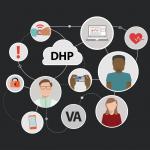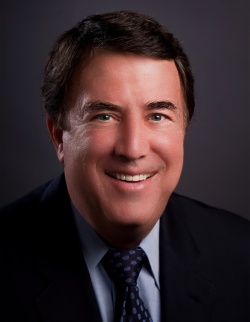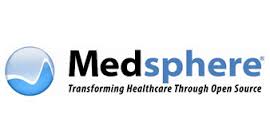News Clips
Obama’s Surprising Answer on Which Part of Obamacare Has Disappointed Him the Most
 There was this moment, about 50 minutes into our interview with President Barack Obama last week, that genuinely surprised me (and surprised other health care journalists, like David Nather, too). My colleague Ezra Klein had asked the president a question about which part of the law had overperformed his expectations, and which part of the law had underperformed. The president gave a surprisingly frank assessment of something his administration has tried, and failed, to do: Get doctors off paper and on to digital medical records...
There was this moment, about 50 minutes into our interview with President Barack Obama last week, that genuinely surprised me (and surprised other health care journalists, like David Nather, too). My colleague Ezra Klein had asked the president a question about which part of the law had overperformed his expectations, and which part of the law had underperformed. The president gave a surprisingly frank assessment of something his administration has tried, and failed, to do: Get doctors off paper and on to digital medical records...
- Login to post comments
Medicaid’s Data Gets an Internet-Era Makeover
 Jini Kim’s relationship with Medicaid is business and personal. Her San Francisco start-up, Nuna, while working with the federal government, has built a cloud-computing database of the nation’s 74 million Medicaid patients and their treatment. Medicaid, which provides health care to low-income people, is administered state by state. Extracting, cleaning and curating the information from so many disparate and dated computer systems was an extraordinary achievement, health and technology specialists say. This new collection of data could inform the coming debate on Medicaid spending...
Jini Kim’s relationship with Medicaid is business and personal. Her San Francisco start-up, Nuna, while working with the federal government, has built a cloud-computing database of the nation’s 74 million Medicaid patients and their treatment. Medicaid, which provides health care to low-income people, is administered state by state. Extracting, cleaning and curating the information from so many disparate and dated computer systems was an extraordinary achievement, health and technology specialists say. This new collection of data could inform the coming debate on Medicaid spending...
- Login to post comments
Veterans Health Administration Thinks Key to Interoperability May Be in the Cloud
 The giant Veterans Health Administration is poking its head into the cloud to see if therein lies the key to sharing data within and outside of its sprawling healthcare delivery system. The goal of the Digital Health Platform is to pull patient data from the VA, military and commercial electronic health record systems, applications, devices and wearables and send it to a patient's healthcare team in real-time. That would allow patients to more easily obtain health care from physicians and hospitals outside of VA facilities, but some experts say a cloud-based platform also leaves it vulnerable to hackers...
The giant Veterans Health Administration is poking its head into the cloud to see if therein lies the key to sharing data within and outside of its sprawling healthcare delivery system. The goal of the Digital Health Platform is to pull patient data from the VA, military and commercial electronic health record systems, applications, devices and wearables and send it to a patient's healthcare team in real-time. That would allow patients to more easily obtain health care from physicians and hospitals outside of VA facilities, but some experts say a cloud-based platform also leaves it vulnerable to hackers...
- Login to post comments
PokitDok Achieves EHNAC Cloud-Enabled and Outsourced Services Accreditation for Health Information Exchange
 PokitDok, a software development platform for the business of healthcare, announced today it has achieved full accreditation with the Outsourced Services Accreditation Program (OSAP) for Health Information Exchange (HIE) and the Cloud-Enabled Accreditation Program (CEAP) from the Electronic Healthcare Network Accreditation Commission (EHNAC)...
PokitDok, a software development platform for the business of healthcare, announced today it has achieved full accreditation with the Outsourced Services Accreditation Program (OSAP) for Health Information Exchange (HIE) and the Cloud-Enabled Accreditation Program (CEAP) from the Electronic Healthcare Network Accreditation Commission (EHNAC)...
- Login to post comments
AACR Project GENIE Publicly Releases Large Cancer Genomic Data Set
 The American Association for Cancer Research (AACR) today announced the first public release of cancer genomic data aggregated through its initiative known as AACR Project Genomics Evidence Neoplasia Information Exchange (GENIE). The data set includes nearly 19,000 de-identified genomic records collected from patients who were treated at eight international institutions, making it among the largest fully public cancer genomic data sets released to date...
The American Association for Cancer Research (AACR) today announced the first public release of cancer genomic data aggregated through its initiative known as AACR Project Genomics Evidence Neoplasia Information Exchange (GENIE). The data set includes nearly 19,000 de-identified genomic records collected from patients who were treated at eight international institutions, making it among the largest fully public cancer genomic data sets released to date...
- Login to post comments
GRAIL Plans to Raise in Excess of $1B in Series B Funding
Illumina, Inc., today announced that GRAIL has received indications of interest to invest approximately $1B for its Series B financing, primarily from undisclosed private and strategic investors. GRAIL intends to raise additional capital in the Series B financing from other investors and has engaged Goldman Sachs as a placement agent in connection with the contemplated additional financing. GRAIL intends to close the Series B prior to the end of the first quarter...
- Login to post comments
2017 Emerges as Pivotal Year for FHIR Interoperability Standard
 Health Level Seven International’s Fast Healthcare Interoperability Resources (FHIR) application programming interface is moving closer to becoming a mature standard, with the “normative” version slated for release sometime in 2017. Standards are widely perceived as providing the greatest potential for achieving national health IT interoperability in the near future. In particular, FHIR is seen by industry stakeholders as a promising solution to the complex interoperability challenges that are confronting healthcare organizations...
Health Level Seven International’s Fast Healthcare Interoperability Resources (FHIR) application programming interface is moving closer to becoming a mature standard, with the “normative” version slated for release sometime in 2017. Standards are widely perceived as providing the greatest potential for achieving national health IT interoperability in the near future. In particular, FHIR is seen by industry stakeholders as a promising solution to the complex interoperability challenges that are confronting healthcare organizations...
- Login to post comments
There's a Linux-Powered Car in Your Future
 Linux is everywhere. And, I mean everywhere. You name it, home electronics, smartphones, and, of course, computers. But, one place you probably didn't think of Linux living is sitting in your driveway right now: Your car. If it's not already, your car will soon be running Linux. The Automotive Grade Linux (AGL) group's membership is a who's who of car manufacturers. This includes: Mazda. Suzuki, Honda, Nissan, Ford, and the world's largest automobile company: Toyota. And, their numbers are only increasing...
Linux is everywhere. And, I mean everywhere. You name it, home electronics, smartphones, and, of course, computers. But, one place you probably didn't think of Linux living is sitting in your driveway right now: Your car. If it's not already, your car will soon be running Linux. The Automotive Grade Linux (AGL) group's membership is a who's who of car manufacturers. This includes: Mazda. Suzuki, Honda, Nissan, Ford, and the world's largest automobile company: Toyota. And, their numbers are only increasing...
- Login to post comments
Open Source is Helping to Drive the Artificial Intelligence Renaissance
 We're only a few days into 2017, and it's already clear that one of the biggest tech categories of this year will be artificial intelligence. The good news is that open source AI tools are proliferating and making it easy for organizations to leverage them. AI is also driving acquisitions. As Computerworld is reporting, in the past year, at least 20 artificial intelligence companies have been acquired, according to CB Insights, a market analysis firm. MIT Technology Review is out with its five big predictions for AI this year. Here is a bit on what they expect, and some of the open source AI tools that you should know about...
We're only a few days into 2017, and it's already clear that one of the biggest tech categories of this year will be artificial intelligence. The good news is that open source AI tools are proliferating and making it easy for organizations to leverage them. AI is also driving acquisitions. As Computerworld is reporting, in the past year, at least 20 artificial intelligence companies have been acquired, according to CB Insights, a market analysis firm. MIT Technology Review is out with its five big predictions for AI this year. Here is a bit on what they expect, and some of the open source AI tools that you should know about...
- Login to post comments
Open Source EHR Company Achieves 48 Percent Revenue Growth in 2016
 Medsphere Systems Corporation, the leading provider of affordable and interoperable healthcare information technology (IT) solutions and services, is welcoming the new year with excitement and anticipation following a busy and historic 2016. Significant recent achievements include an expansion of company products and services as well as a record number of new clients and unprecedented revenue growth. The company’s ongoing efforts to make affordable healthcare IT more widely available have resulted in specific indicators from the previous calendar year of growth and success...
Medsphere Systems Corporation, the leading provider of affordable and interoperable healthcare information technology (IT) solutions and services, is welcoming the new year with excitement and anticipation following a busy and historic 2016. Significant recent achievements include an expansion of company products and services as well as a record number of new clients and unprecedented revenue growth. The company’s ongoing efforts to make affordable healthcare IT more widely available have resulted in specific indicators from the previous calendar year of growth and success...
- Login to post comments
Linux 2017: With Great Power Comes Great Responsibility
 In 2016, Linux turned 25. When it began, it was a student project. Today, Linux runs everything. From smartphones to supercomputers to web servers to clouds to the car, it's all Linux, all the time. Even the one exception, the end-user, is moving to Linux. Android is now the most popular end-user opearating system. In addition, Chromebooks are becoming more popular. Indeed, even traditional Linux desktops such as Fedora, openSUSE, Mint, and Ubuntu are finally gaining traction. Heck, my TechRepublic Linux buddy Jack Wallen even predicts that "Linux [desktop] market share will finally breach the 5-percent mark"...
In 2016, Linux turned 25. When it began, it was a student project. Today, Linux runs everything. From smartphones to supercomputers to web servers to clouds to the car, it's all Linux, all the time. Even the one exception, the end-user, is moving to Linux. Android is now the most popular end-user opearating system. In addition, Chromebooks are becoming more popular. Indeed, even traditional Linux desktops such as Fedora, openSUSE, Mint, and Ubuntu are finally gaining traction. Heck, my TechRepublic Linux buddy Jack Wallen even predicts that "Linux [desktop] market share will finally breach the 5-percent mark"...
- Login to post comments
16% of Healthcare Stakeholders Plan to Use Blockchain by 2017
Blockchain may have entered the healthcare lexicon in 2016 as a somewhat fuzzy concept, but the innovative method of securing and validating data transactions is poised to take the industry by storm over the next twelve months, according to an international survey conducted by IBM. Sixteen percent of the 200 healthcare executives participating in the poll have concrete plans to implement a commercial blockchain solution within their organizations in 2017, while an additional 56 percent are likely to follow by the end of the decade...
- Login to post comments
EHRs, IoT, Revenue Cycle Bring Opportunities for Healthcare APIs
 Application programming interfaces (APIs) are quickly becoming a critical tool for healthcare organizations looking to build interoperable connections, and it is likely that this new standard for health data exchange will keep growing in importance during the next few years. A new report from Market Research Engine (MRE) predicts healthy growth for the nascent healthcare API ecosystem, forecasting a 4 percent compound annual growth rate (CAGR) that will produce a $234 million market by 2024....
Application programming interfaces (APIs) are quickly becoming a critical tool for healthcare organizations looking to build interoperable connections, and it is likely that this new standard for health data exchange will keep growing in importance during the next few years. A new report from Market Research Engine (MRE) predicts healthy growth for the nascent healthcare API ecosystem, forecasting a 4 percent compound annual growth rate (CAGR) that will produce a $234 million market by 2024....
- Login to post comments
Why Should Hackers Have Easier Access to EHRs than Patients?
In a Jan. 2 New York Times opinion piece, Eric Topol, MD, professor at the Scripps Research Institute, and Kathryn Haun, a federal prosecutor who teaches a course on cybercrime at Stanford Law, take aim at what they call "quite a paradox": the fact that most patients still can't readily access their own health data, even as there's "an epidemic of cybercriminals and thieves hacking and stealing this most personal information"...
- Login to post comments
Data Breaches Through Wearables Put Target Squarely on IoT in 2017
Security needs to be baked into IoT devices for there to be any chance of halting a DDoS attack, according to security experts. Read More »
- Login to post comments